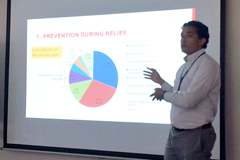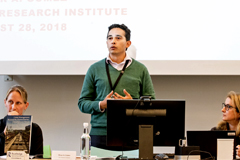JICA-RI Researcher Gomez Presents Research Results on the Continuum of Crisis Management at Conferences in Morioka and The Hague
2018.09.10
The global community now understands that crisis management entails more than the mere provision of short-term relief. It also comprises long-term recovery assistance and support to prevent the recurrence of crises. However, this continuum from relief to rehabilitation and prevention and development has often been difficult to achieve.
A three-year JICA Research Institute (JICA-RI) project titled “Comparative Study of Humanitarian Crisis Management from the Perspective of Bilateral Cooperation Agencies” has examined the manners in which international organizations, bilateral cooperation agencies, NGOs, research institutes, and local actors have approached this continuum.

JICA-RI Research Fellow Oscar A. Gomez presented the research findings at the Global Conference of the International Network of Disaster Studies
Between July 17 and 19, 2018, JICA-RI Research Fellow Oscar A. Gomez presented the findings of the project at the Global Conference of the International Network of Disaster Studies. The conference was held in Morioka, Iwate Prefecture, one of the areas affected by the 2011 Great East Japan Earthquake.
Over 500 participants gathered from more than 15 countries for the conference, which was collaboratively organized by the Research Center for Regional Disaster Management, Iwate University; Center for Crisis Management Research, School of Public Policy and Management, Tsinghua University; the Program on Crisis Leadership, Ash Center for Democratic Governance; and the Innovation and Taubman Center for State and Local Government, Harvard Kennedy School.
During the panel session “Crisis Management beyond the Humanitarian-Development Nexus: The continuum in the management of disasters,” Gomez discussed how to mainstream prevention in international cooperation. He emphasized the need for preventive measures to be taken both during relief operations and through the recovery phase, and pushed for the institutionalization of prevention efforts. To make his point, Gomez focused on case studies of the 1998 Hurricane Mitch, which tore across the Honduras. Other members of the research team, Mikio Ishiwatari, senior advisor on Disaster Management and Water Resource Management, JICA, and Yasuhito Jibiki, assistant professor, International Research Institute of Disaster Science, Tohoku University, also participated in the panel discussions. Ishiwatari discussed the instances of the Indian Ocean tsunami and the Java earthquake in Indonesia, and Jibiki shared insights from the case study of Typhoon Yolanda in the Philippines.
Based on the case studies, Gomez explained the difficulty to integrate prevention into the overall process of disaster management, particularly into the post-disaster agenda. He observed the difficulties pertained to the ownership of the disaster management process. Paradoxically, as ownership of recipient countries of the process increases, the need of donor coordination decreases. In turn, donors revert to relief or other support activities that occur during the earlier phase of the continuum, which makes prevention integration more difficult. Additionally, the structural characteristics of funding procedures further complicate the process of bridging the gap between relief efforts and the rest of the crisis management process. Gomez maintained that enhancing in-depth local knowledge in each sector will help realize the continuum in crisis management.
In the Q&A session that followed, an audience member commented that although donors go back to supporting relief activities, other donors could make up for the loss brought about by the shift. Gomez replied, “Even so, since recipient countries are not able to re-orient funds allocated to unnecessary relief activities, distribution of funds remains a problem.”
The outcomes of the research project will be published by Routledge in September 2018 in the form of a book entitled “Crisis Management Beyond the Humanitarian-Development Nexus.”

Gomez participated in the 5th bi-annual International Humanitarian Studies Association Conference held in The Hague (photo: Annik de Carufel)
Between August 27 and 29, 2018, Gomez participated in the 5th bi-annual International Humanitarian Studies Association Conference held in The Hague, the Netherlands, where a roundtable was held on the book and Gomez made presentations on humanitarianism and the Global South from the perspective of emerging Latin American powers and the ASEAN plus three nations.
Routledge Website

事業事前評価表(地球規模課題対応国際科学技術協力(SATREPS)).国際協力機構 地球環境部 . 防災第一チーム. 1.案件名.国 名: フィリピン共和国.

事業事前評価表(地球規模課題対応国際科学技術協力(SATREPS)).国際協力機構 地球環境部 . 防災第一チーム. 1.案件名.国 名: フィリピン共和国.

事業事前評価表(地球規模課題対応国際科学技術協力(SATREPS)).国際協力機構 地球環境部 . 防災第一チーム. 1.案件名.国 名: フィリピン共和国.

事業事前評価表(地球規模課題対応国際科学技術協力(SATREPS)).国際協力機構 地球環境部 . 防災第一チーム. 1.案件名.国 名: フィリピン共和国.

事業事前評価表(地球規模課題対応国際科学技術協力(SATREPS)).国際協力機構 地球環境部 . 防災第一チーム. 1.案件名.国 名: フィリピン共和国.
scroll